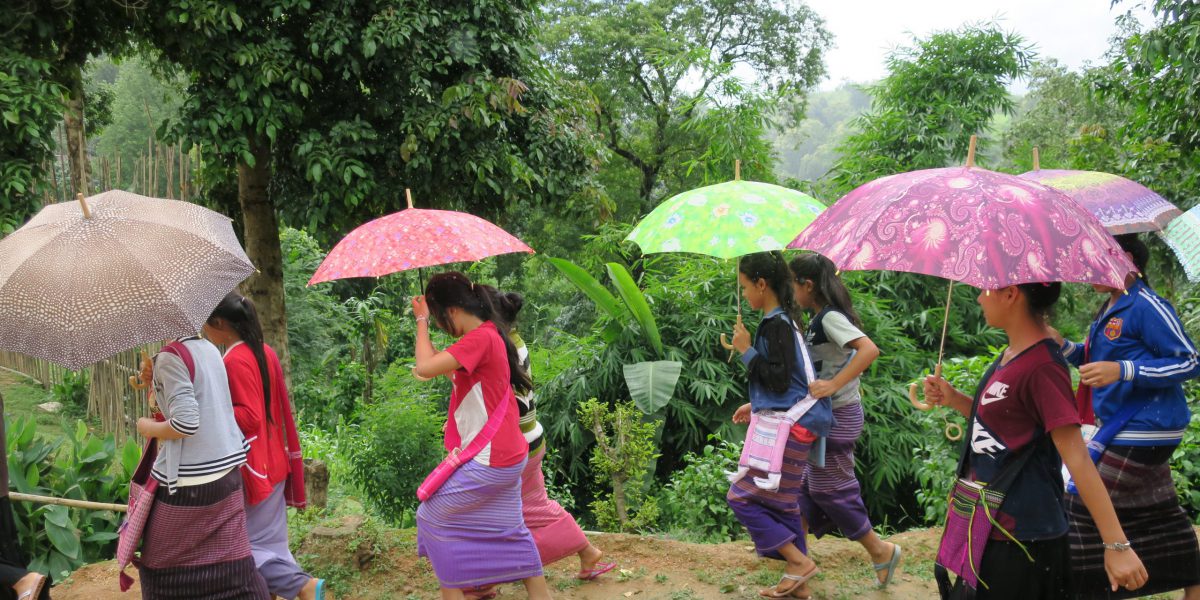Thailand: A Timely Answer
19 December 2019|Joe Hampson S.J.

Almost 40 years ago, Fr Pedro Arrupe, then Superior General of the Society of Jesus established Jesuit Refugee Service (JRS) in 1980. His last act before he was incapacitated by a stroke, was to visit Thailand and encourage the Jesuits in their ministry with refugees. Nearly four decades later, a few weeks ago, Pope Francis visited the same country which is now host to nearly one hundred thousand Myanmar refugees along the eastern border living in nine camps, or as the Thai government call “temporary shelters,” some five thousand urban refugees and asylum seekers, and nearly a half million stateless persons.
I was able to be a part of a group that met with Pope Francis in Thailand. I told him there are many refugees in Thailand and asked him what advice he would give to our teams on negotiating “our little path.” His answer was long, heartfelt, and incredibly timely given the global conversation taking place this week the first Global Refugee Forum.
He confirmed his great admiration for Arrupe. Over the year, the work that JRS does has grown, but so has the need, as migratory movements are intensifying throughout the world, a world where refugees are treated like waste material, turning the “Mediterranean into a cemetery.” Pope Francis expressed shock at the discourse now seen in Europe about borders, and expressed his displeasure about places walls are used to separate children from parents.
Francis also linked work in forced migration with human trafficking and the various forms of modern slavery. We, as Church, have to counteract these attitudes with as many small customs and traditions of welcome, hospitality, and accompaniment as we can find — for example, having an empty chair on feast days in case of an unexpected guest. In a memorable image, he said that “if the Church is a field hospital, this is one of the camps where most of the injured are found. It is these hospitals that we need to go to most.” He ended his thoughts on refugees by returning to the idea of refugee work as a theological place. He encouraged that we be mindful of both the physical and the spiritual, and to not neglect prayer in our work with and for refugees. Only with that combination, he said, will we have the strength and inspiration to engage fruitfully with the messy consequences of social justice.
I feel that Pope Francis asked me and my Jesuit brothers to stand against the current narrative of refugees as a threat from outside – a narrative that can even facilitate the scourge of modern slavery and trafficking. In a world where 37,000 people are forced to flee their homes every day because of conflict or persecution, Francis encourages us to practice hospitality for the stranger in ways small and large.
The situation for forcibly displaced people in Thailand is currently challenging. Though Thailand is not signatory to the Refugee Convention of 1951 and does not recognize the majority of refugee living within its borders as such, it has offered space for shelter to refugees and allowed NGOs to supply basic necessities and assist with health, education, and ensuring refugee protection and safeguarding. Both camp-based and urban refugees in Thailand tell us of three pressing concerns: lack of ID documentation, access to essential services, and livelihood opportunities. These three challenges affect refugee daily life, and reduce their ability to be self-reliant or to make meaningful contributions to their community.
The international community is convening the first Global Refugee Forum this week. Francis’ call to his fellow Jesuits in Thailand is a timely reminder to all people and communities concerned about migration to strive for a more effective response to the challenge posed by refugees and forced migrants. In preparing for the Global Forum, the President of Caritas, Cardinal Tagle, told a gathering of faith-based organizations that “if the dream of a peaceful world is shared by all, if the refugees’ and migrants’ contribution is properly evaluated, then humanity can become more of a universal family and our earth a true common home”. Such growth in mutual respect, dialogue, friendship and solidarity is something all concerned citizens of our global home are being challenged to work for.



